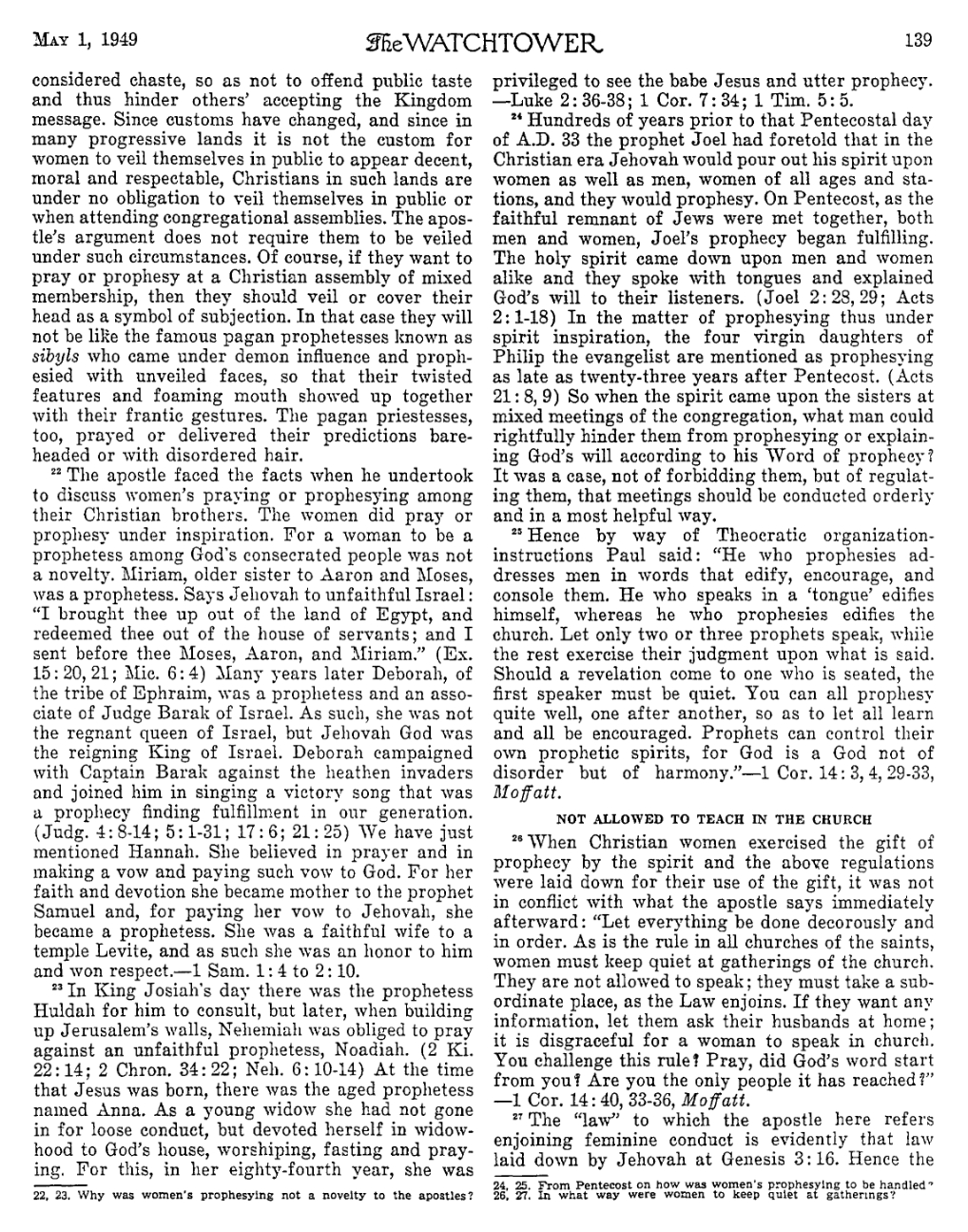This page has not been proofread
May 1, 1949
The WATCHTOWER
139
considered chaste, so as not to offend public taste and thus hinder others' accepting the Kingdom message. Since customs have changed, and since in many progressive lands it is not the custom for women to veil themselves in public to appear decent, moral and respectable, Christians in such lands are under no obligation to veil themselves in public or when attending congregational assemblies. The apostle's argument does not require them to be veiled under such circumstances. Of course, if they want to pray or prophesy at a Christian assembly of mixed membership, then they should veil or cover their head as a symbol of subjection. In that case they will not be like the famous pagan prophetesses known as sibyls who came under demon influence and prophesied with unveiled faces, so that their twisted
features and foaming mouth showed up together with their frantic gestures. The pagan priestesses, too, prayed or delivered their predictions bareheaded or with disordered hair.
22 The apostle faced the facts when he undertook to discuss women's praying or prophesying among their Christian brothers. The women did pray or prophesy under inspiration. For a woman to be a prophetess among God's consecrated people was not a novelty. Miriam, older sister to Aaron and Moses, was a prophetess. Says Jehovah to unfaithful Israel: "I brought thee up out of the land of Egypt, and redeemed thee out of the house of servants; and I sent before thee Moses, Aaron, and Miriam." (Ex. 15: 20, 21; Mic. 6: 4) Many years later Deborah, of the tribe of Ephraim, was a prophetess and an associate of Judge Barak of Israel. As such, she was not the regnant queen of Israel, but Jehovah God was the reigning King of Israel. Deborah campaigned with Captain Barak against the heathen invaders and joined him in singing a victory song that was a prophecy finding fulfillment in our generation. (Judg. 4:8-14; 5:1-31; 17:6; 21:25) We have just mentioned Hannah. She believed in prayer and in making a vow and paying such vow to God. For her faith and devotion she became mother to the prophet
Samuel and, for paying her vow to Jehovah, she became a prophetess. She was a faithful wife to a temple Levite, and as such she was an honor to him and won respect.- l Sam. 1: 4 to 2: 10.
23 In King Josiah's day there was the prophetess Huldah for him to consult, but later, when building up Jerusalem's walls, Nehemiah was obliged to pray against an unfaithful prophetess, Noadiah. (2 Ki. 22: 14; 2 Chron. 34: 22; Neh. 6: 10-14) At the time that Jesus was born, there was the aged prophetess named Anna. As a young widow she had not gone in for loose conduct, but devoted herself in widowhood to God's house, worshiping, fasting and praying. For this, in her eighty-fourth year, she was
privileged to see the babe Jesus and utter prophecy. -Luke 2: 36-38; 1 Cor. 7: 34; 1 Tim, 5: 5.
24 Hundreds of years prior to that Pentecostal day of A.D. 33 the prophet Joel had foretold that in the Christian era Jehovah would pour out his spirit upon women as well as men, women of all ages and stations, and they would prophesy. On Pentecost, as the faithful remnant of Jews were met together, both men and women, Joel's prophecy began fulfilling. The holy spirit came down upon men and women alike and they spoke with tongues and explained God's will to their listeners. (Joel 2: 28, 29; Acts 2: 1-18) In the matter of prophesying thus under spirit inspiration, the four virgin daughters of Philip the evangelist are mentioned as prophesying as late as twenty-three years after Pentecost. (Acts 21: 8, 9) So when the spirit came upon the sisters at mixed meetings of the congregation, what man could
rightfully hinder them from prophesying or explaining God's will according to his Word of prophecy? It was a case, not of forbidding them, but of regulating them, that meetings should be conducted orderly and in a most helpful way.
25 Hence by way of Theocratic organization-instructions Paul said: "He who prophesies addresses men in words that edify, encourage, and console them. He who speaks in a 'tongue' edifies himself, whereas he who prophesies edifies the church. Let only two or three prophets speak, while the rest exercise their judgment upon what is said. Should a revelation come to one who is seated, the first speaker must be quiet. You can all prophesy quite well, one after another, so as to let all learn and all be encouraged. Prophets can control their own prophetic spirits, for God is a God not of
disorder but of harmony."-l Cor. 14: 3,4,29-33, Moffatt.
NOT ALLOWED TO TEACH IN THE CHURCH
26 When Christian women exercised the gift of prophecy by the spirit and the above regulations were laid down for their use of the gift, it was not in conflict with what the apostle says immediately afterward: "Let everything be done decorously and in order. As is the rule in all churches of the saints, women must keep quiet at gatherings of the church.
They are not allowed to speak; they must take a subordinate place, as the Law enjoins. If they want any information, let them ask their husbands at home; it is disgraceful for a woman to speak in church. You challenge this rule? Pray, did God's word start from you? Are you the only people it has reached?"--1 Cor. 14: 40,33-36, Moffatt.
27 The "law" to which the apostle here refers enjoining feminine conduct is evidently that law laid down by Jehovah at Genesis 3: 16. Hence the
